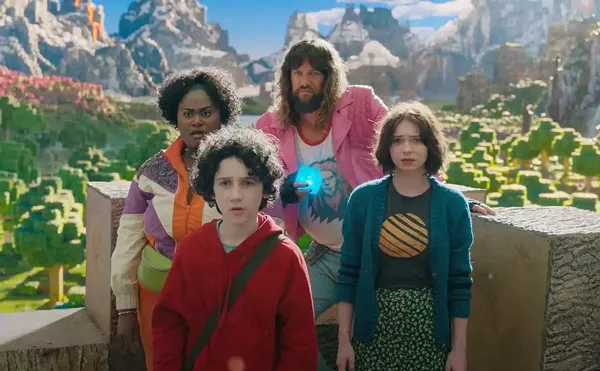"This is a very tricky, very disturbing movie," Todd Solondz said of his second film, Happiness, "and I think it's not easy to categorize, perhaps, because there aren't signposts. There is a moral underpinning -- there is a moral anchor here -- but at the same time it doesn't tell people what is right and what is wrong. It doesn't tell you what to think."
Happiness, the idiosyncratic writer-director's follow-up to the stunning tragi-comedy of seventh-grade-misfit life, Welcome to the Dollhouse (1995), follows the often humorous -- and more often troubled -- lives of three adult sisters in suburban New Jersey and their extended circle. But despite the fact that it features a hilarious and heartfelt rendition of "You Light Up My Life," what Solondz has created is much more complex than a satire of suburbia.
Todd Solondz dances on a tightrope with Happiness. He loads the film with a host of hot-button topics -- ranging from masturbation and misogynist fantasies to pedophilia, rape and murder -- but creates a very specific tone that's irony-tinged and avoids any hint of righteous indignation. While being nonexploitative -- there's more nudity on network television -- Solondz exposes the very real flaws, troubles and even pathology of his characters to the camera's relentless glare in ways that cause audiences to both laugh and squirm.
Actually, it was the latter reaction on the part of the film's financiers that has led to much of the notoriety surrounding Happiness. The film's $2.5 million budget came courtesy of October Films, which was to also distribute the film domestically. But after Happiness was screened at the Cannes Film Festival -- and won the International Critics' Jury Prize -- the film's future was put into question. October is owned by Universal Pictures, which is in turn part of the sizable Seagram empire. After viewing Solondz's cut of Happiness, and anticipating an NC-17 rating, the parent company exercised an option not to distribute the film.
"Certainly it's reflective of a discomfort with a kind of movie that addresses seriously issues that are taboo, even if we see them every day on TV," Solondz said at the Toronto International Film Festival, where Happiness won the Metro-Media Award, voted on by the press in attendance.
"I'd be a little inaccurate [to say] it implies a kind of censorship," he continued, "and there is no censorship that's going on. In point of fact, after they announced that, we got 20 other phone calls saying, 'We want this movie'."
Happiness is being released unrated by Good Machine, an independent production company which began a distribution arm to handle the film -- Good Machine co-founder Ted Hope is one of the film's producers. Ironically, Happiness opened at Landmark's Main Art Theatre on the same day as the NC-17 rated Orgazmo, a raunchy porn spoof distributed by October Films.
"This movie may be funny, but it's not a joke," Solondz said regarding the complex responses to Happiness. "I don't think you can be glib about the stuff that goes on in this movie. Nevertheless, and this is a really tricky thing with the way the humor is used, there's a kind of double-edge.
"I do really care very much about these characters," he continued, "but there is a kind of irony at work. I think that's why people are laughing, and without that kind of detachment, it would just be too unbearable, it's so painful."
Todd Solondz cites two superb films as directly influencing Happiness -- Alfred Hitchcock's Shadow of a Doubt and Fritz Lang's M -- as well as Vladimir Nabokov's novel Lolita, which he calls "a hilarious tragedy." Then there is the overriding presence of television in his consciousness.
"I grew up on TV. I was intravenously fed -- this was my childhood -- I have that imprint," said Solondz, who was born in Newark, raised in the vast suburbs of New Jersey and attended film school at New York University. "I think that has an effect; you respond to that later in life."
Overall, Solondz perceives the purpose of Happiness as a way for audiences to see beyond the surface of people they might normally dismiss.
"It's not about judging, punishing, so to speak, these characters," he explained, "but it's about exploring and understanding what makes them tick. So in the end, while you may not sympathize in fact (with them), there must be some kind of recognition that there is a kind of humanity there that we are all a part of, and that is a very painful thing that many of us will be reluctant to acknowledge.
"If the audience walks out of this movie saying, 'Oh, what a bunch of freaks'," Todd Solondz added, "I will have failed."






